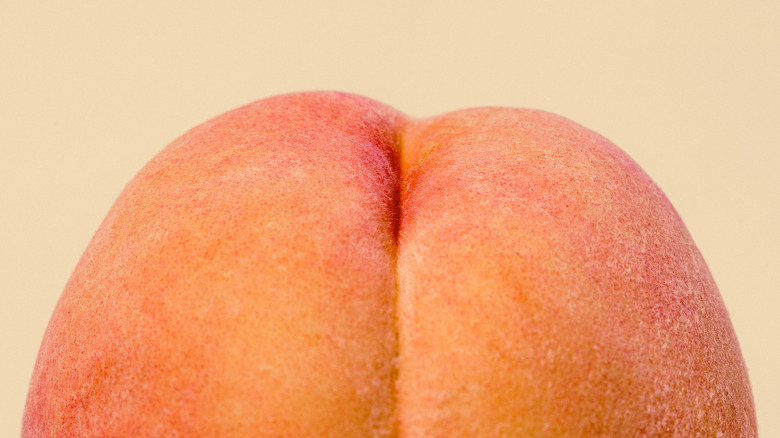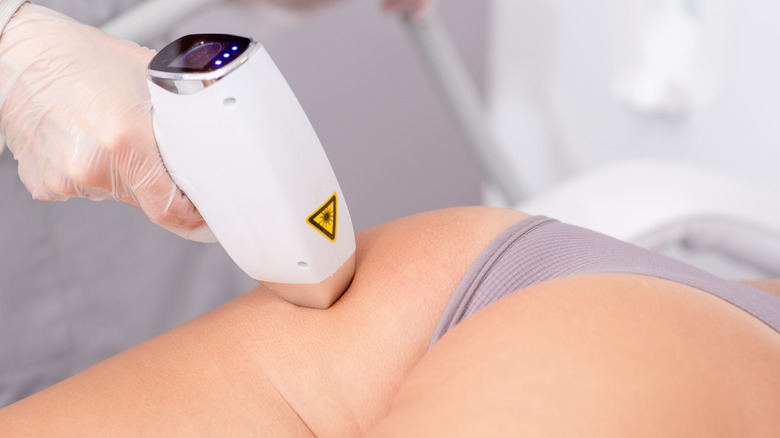FYI, Butt Hair Is Normal. But If You Choose To Remove It, Here Are The Things To Keep In Mind
Butts have hair — point blank. Just like how hair grows out of your head, arms, legs, groin, belly, and pretty much everywhere else on the body, including the insides of your nose and ears, your tush has hair. The funny thing is, butt hair is stigmatized despite not being publicly visible. It may not be as intensely balked at compared to, say, armpit hair or pubic hair, but the very idea of butt hair is nearing taboo territory. It's no wonder it also gets yanked out during a Brazilian wax. If you feel like Chewbacca for the mere presence of hair in your derriere, just know that nearly everybody has it, too. "Most people grow hair around their anus and on their buttocks, and it's completely normal," board-certified dermatologist Dr. Anna Chacon, told Women's Health.
Keeping your butt hair, however, is a whole other story. Since it grows on the body, it has to serve some kind of purpose, right? And if you decide to remove it completely, the question remains: will doing so pose a risk? To get to the bottom (pun intended) of things, let's crack into (got you again) butt hair, its purpose, and removal methods.
Why do we have butt hair in the first place?
Hair, at its core, exists to provide the human body with some protection, and in some cases, function as a communication vehicle. "[Body hair] keeps mammals warm. It protects their skin from a lot of external influences, from abrasion, from water, from chemical attack, all sorts of things," Nina Jablonski, an Evan Pugh University professor of anthropology at Pennsylvania State University, explained to Allure. "Hair is really, really useful." For instance, eyelashes protect your peepers from dust and debris, while eyebrows are there to "allow our expressions and moods to be determined or communicated."
All bodily hair apparently serves a purpose, but butt hair? Well, the science on that is still a bit murky. Popular vlogger and scientific communicator Hank Green once theorized in a SciShow video that butt hair may exist simply because there's "no significant evolutionary pressure" against it. Heck, it may even be a "side effect of unintelligent design." He also said that, just as pubic hair minimizes friction during intercourse, butt hair could help prevent cheek-to-cheek chafing, irritation, as well as any burgeoning infections.
No matter what your stance on butt hair is, there's no denying that it's quite useful, even though it can sometimes feel like a nuisance. "It is only considered problematic if it concerns you, and if it impairs your quality of life to a certain extent," Dr. Anna Chacon noted. "For example, if you are experiencing folliculitis, itching, discomfort, or ingrown hairs secondary to excess hair growth on the buttocks."
Are there downsides to removing butt hair?
If butt hair feels like an unnecessary accessory, no one will fault you for wanting to get rid of it. If you want a smoother behind, then, by all means, kick your crack hair to the curb. All you need to do is be careful with the way you choose to remove it. "I have not found that people who have removed hair from the buttocks are at an increased risk of infections. However, trauma to the skin from the hair removal process itself can put you at risk for an infection if you have any open or raw skin," dermatologist Dr. Joshua Zeichner told Refinery29.
For getting rid of butt hair, you may want to veer away from the razor, tweezers, and wax strips entirely and opt for scissors or clippers instead. "Shaving will cause more itching and discomfort as the hair grows back," Lisa Hugh, registered dietitian and producer of the Poop Problems Podcast, explained to Fatherly. "Waxing is associated with ingrown hairs. And chemical products can cause burns on the sensitive skin."
For fool-proof tushy grooming, your safest bet is to resort to laser hair removal, although this option can be expensive and out of reach for many. "I am finding laser hair removal in this area [to be] increasingly popular in my practice. When done carefully, it is possible to remove the hair safely," continued Dr. Zeichner. Or you know, you can just let it be. It's not like it's much of a nuisance, anyway.

